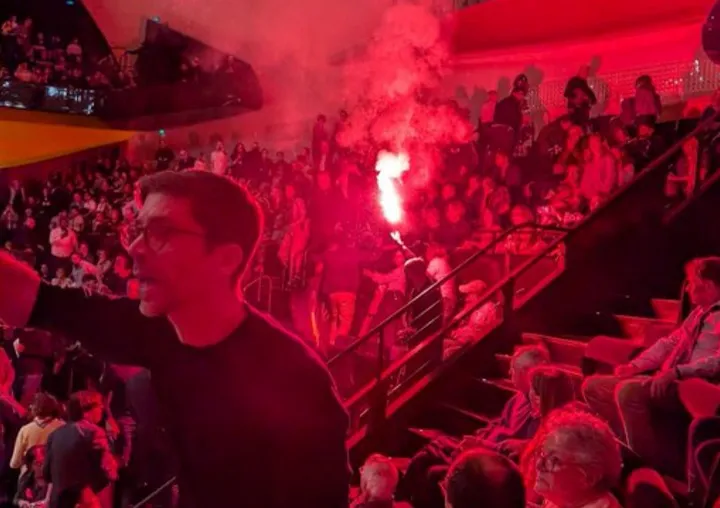Actors have taken to picket lines outside studio headquarters from California to New York as movie and television production ground to a halt in the most serious Hollywood strike in decades.
Hundreds of strikers marched on Friday with placards at the Netflix building on Los Angeles' famed Sunset Boulevard, as well as at Disney, Paramount, Warner and Amazon premises, with passing drivers honking their horns in support.
In New York, Jason Sudeikis and Susan Sarandon were among A-listers who showed up for demonstrations, triggered by the refusal of studio bosses to meet actors' demands for better pay and job security.
"The studios are tone-deaf and greedy, and they need to wake up — because we are the ones that made them rich," actress Frances Fisher, who starred in "Titanic," told the AFP news agency while marching outside Paramount Pictures.
Screen Actors Guild [SAG-AFTRA] members joined writers who have been on strike for weeks, triggering the first industry-wide walkout for 63 years and effectively shutting down Hollywood.
"We've been out here for about 80 days... The fact that SAG-AFTRA went on strike brought a lot of energy, and there's incredible solidarity," said "Friends" co-creator Marta Kauffman.
Many on the picket lines took aim at Disney chief executive Bob Iger, who said on Wednesday that the damage the strikes will do to the entertainment economy is "a shame."
"I think that when Bob Iger talks about what a shame it is, he needs to remember that in 1980, CEOs like him made 30 times what their lowest worker was making," actor Sean Gunn, who starred in "Guardians of the Galaxy," said outside Netflix.
Actors formally went on strike at midnight on Thursday after negotiations to reach a new deal with production studios ended without an agreement.
The union's demands have focused on dwindling pay in the streaming era, and the threat posed by artificial intelligence.
"We're in this for the long haul, but this is a historic moment," said Vera Cherny, 44, who has had roles in "The Americans" and "For All Mankind."
"It is time for us to lock down the contracts that are going to serve generations of actors to come. Just like they did in 1960."
Just trying to make a minimum wage
Protesters came out in force on both coasts for Friday's protests. In Manhattan, 36-year-old actress Casey Killoran told AFP that actors are "just trying to make a minimum wage, a living wage in New York City.
"We want to be able to live in the place that we work," she said.
But for now, the "double strike" has essentially shut down all US productions, with limited exceptions such as reality and game shows.
TV shows that had continued to shoot amid the writer's strike, such as "Star Wars" series "Andor," will shut down.
Ongoing production of movies, including superhero flick "Deadpool 3" and the historical epic sequel "Gladiator 2" were also expected to shutter, and their release dates could be postponed if industrial action drags on.
Actors are now prohibited from promoting some of the year's biggest movies, at the peak of the summer blockbuster season.
The A-list cast of Universal's "Oppenheimer," a much-hyped wartime biopic from Christopher Nolan, walked out of their London premiere on Thursday.
SAG-AFTRA represents actors from mega-stars such as Tom Cruise to day-players who take small roles on television series.
Top stars enjoy individual contracts with studios that far exceed the union minimums, which are the focus of the actors' strike, but their presence on picket lines over the coming weeks could help draw attention to the dispute.
"We're part of an industry that has so many people that are front-facing, so that extra PR is gonna be helpful," said Tien Tran, star of sitcom "How I Met Your Father," who was picketing outside Paramount.
The last time the actors' union went on strike, in 1980 over the advent of pay television and home video, it lasted more than three months.
This time, the union says actors' pay has been "severely eroded" by streaming and has warned that artificial intelligence poses "an existential threat."




























